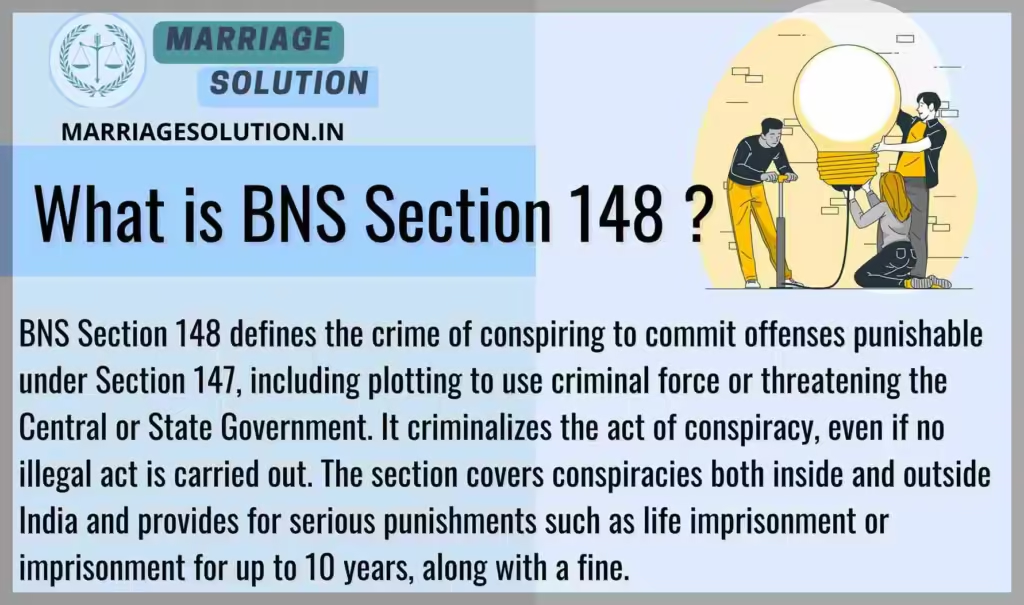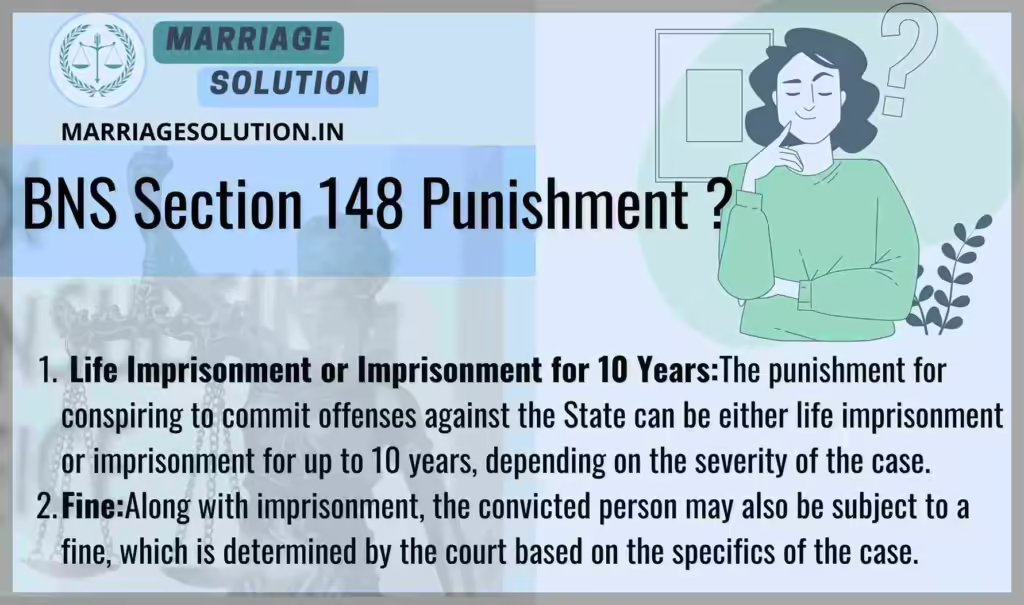Introduction of Section 148 BNS
BNS Section 148 deals with the offense of conspiracy to commit crimes against the State, particularly those mentioned in Section 147, such as waging war or attempting to destabilize the Government of India. The law makes it clear that even the agreement or planning of such acts is a punishable offense, regardless of whether the plan is carried out. By prescribing life imprisonment or up to 10 years’ imprisonment with fine, this section emphasizes the importance of safeguarding national security and preventing threats before they turn into violent actions.
The Bharatiya Nyaya Sanhita (BNS) Section 148 replaces the old Indian Penal Code (IPC) Section 121-A.
- Introduction of Section 148 BNS
- What is section 148 of BNS ?
- Under Section 148 of the bns act 2023
- Examples of BNS Section 148
- Why Section 148 is Important
- Section 148 BNS Overview
- BNS 148 Punishment
- BNS 148 bailable or not ?
- Bharatiya Nyaya Sanhita Section 148
- BNS Section 148 FAQs
- Conclusion
- Need Legal Support?
What is section 148 of BNS ?
BNS Section 148 defines the crime of conspiring to commit offenses punishable under Section 147, including plotting to use criminal force or threatening the Central or State Government. It criminalizes the act of conspiracy, even if no illegal act is carried out. The section covers conspiracies both inside and outside India and provides for serious punishments such as life imprisonment or imprisonment for up to 10 years, along with a fine.

Under Section 148 of the bns act 2023
“Whoever conspires to commit any of the offences punishable by Section 147, whether or not any act or illegal omission takes place in pursuance of such conspiracy, shall be punished with imprisonment for life, or with imprisonment of either description which may extend to ten years, and shall also be liable to fine.”
Explanation of Section 148
Section 148 punishes the conspiracy to commit offenses against the State, particularly those under Section 147 (waging war, attempting to wage war, or abetting such acts).
- Conspiracy Defined → When two or more persons agree to commit a crime, that agreement itself is a crime.
- No Action Needed → Even if no violent act is carried out, the mere planning or agreement to wage war or use force against the Government is punishable.
- Covers Foreign Conspiracies → If people outside India conspire against the Indian Government, they can still be prosecuted.
- Punishment → Life imprisonment, or up to 10 years’ imprisonment, plus fine.
- Offense Classification:
- Cognizable → Police can arrest without warrant.
- Non-bailable → Bail is not easily granted.
- Non-compoundable → Cannot be settled outside court.
- Trial by Court of Session → Due to the seriousness, tried only in higher courts.
Key Elements of Section 148
- Focus on Conspiracy → Targets secret agreements to harm the State.
- No Act Required → Planning alone is sufficient for prosecution.
- Serious Penalties → Life imprisonment or up to 10 years + fine.
- Covers Inside & Outside India → Cross-border conspiracies included.
- Cognizable & Non-Bailable → Ensures strong enforcement.
- Court of Session Trial → Reflects the severity of the crime.
- State Security Protection → Prevents rebellion before it occurs.
Examples of BNS Section 148
Example 1 – Foreign Conspiracy:
A group abroad meets secretly to plan an armed rebellion in India. Even though no weapons are used yet, they are guilty under Section 148.
Example 2 – Domestic Conspiracy:
Leaders of an extremist group in India conspire to overthrow a state government using armed force. Even before execution, the conspiracy itself is punishable under Section 148.
Why Section 148 is Important
- Stops Crimes at Planning Stage → Prevents rebellion before it turns violent.
- Protects Sovereignty → Safeguards the Indian State from internal & external threats.
- Strict Punishment → Life imprisonment deters conspiracies against the Government.
- Broader Coverage than IPC → BNS makes conspiracies punishable even without any overt act.
Section 148 BNS Overview
Section 148 of the Bharatiya Nyaya Sanhita addresses the crime of conspiracy to commit offenses against the Government, either at the Central or State level. It includes plotting or planning to use criminal force to intimidate or harm the government. Importantly, the conspiracy does not need to result in any actual illegal act; the mere act of conspiring is considered an offense. Punishments for such conspiracies range from life imprisonment to 10 years imprisonment, with the possibility of an additional fine.
Section 148 BNS Overview :10 Key Points
- Definition of Conspiracy:
Conspiracy means two or more people agreeing to commit a crime. In this case, the crime is something that threatens the Central or State Government. - Targeting the Government:
The law applies to conspiracies that use or threaten to use criminal force against the government. This could include planning to overthrow or harm the government. - Punishable Even Without Action:
The law punishes conspirators even if no actual crime is committed. Simply planning or discussing a criminal act against the government is enough for prosecution. - Covers Acts Beyond India:
This law is not limited to conspiracies formed within India. Even if the conspiracy takes place outside the country, the individuals involved can be punished if the plan targets the Indian government. - Serious Penalties:
The punishment is severe, with options ranging from life imprisonment to imprisonment for up to 10 years, along with a fine. - Cognizable Offense:
A cognizable offense means that the police can arrest someone involved in the conspiracy without a warrant if there is evidence of wrongdoing. - Non-Bailable Offense:
Being non-bailable means the accused does not have the automatic right to bail and can be held in custody while awaiting trial. - Triable by Court of Session:
This type of serious offense is tried in the Court of Session, which handles major criminal cases. - National Security Focus:
This section is focused on protecting the nation’s security by targeting those who conspire to harm the government. - Imprisonment and Fine:
Besides the prison sentence, individuals convicted under this section may also be subject to a fine. The amount of the fine is determined by the court based on the circumstances of the case.
Examples of BNS Section 148
- Example 1:
A group of individuals in a foreign country plan to overthrow the Indian government by using force. Even though they haven’t taken any action yet, the mere fact that they are conspiring to commit such a crime makes them liable for prosecution under BNS Section 148. - Example 2:
A leader of a political group within India meets with others to plot the use of armed force to take over a state government. Even though no attack has occurred, their conspiracy is enough to be charged under BNS Section 148, as they are planning to use criminal force against the government.
BNS 148 Punishment
Life Imprisonment or Imprisonment for 10 Years:
The punishment for conspiring to commit offenses against the State can be either life imprisonment or imprisonment for up to 10 years, depending on the severity of the case.
Fine:
Along with imprisonment, the convicted person may also be subject to a fine, which is determined by the court based on the specifics of the case.

BNS 148 bailable or not ?
No, BNS Section 148 is a non-bailable offense. This means that the accused cannot obtain bail as a matter of right and will typically remain in custody until the case is resolved unless the court grants bail under special circumstances.
Comparison : BNS Section 148 vs IPC Section 121A
| Section | What it Means | Punishment | Bail | Cognizable? | Trial By |
|---|---|---|---|---|---|
| BNS Section 148 | Deals with conspiracy to commit offenses under Section 147 — including planning or agreeing to wage war or threaten the Government of India. Even if no act is done, agreement alone is punishable. | Life imprisonment or imprisonment up to 10 years, along with fine. | Non-bailable (bail not easily granted) | Cognizable (police can arrest without warrant) | Court of Session |
| IPC Section 121A (Old) | Earlier law punishing conspiracy to wage war or overawe the Government by criminal force. Did not clearly include conspiracies formed outside India. | Life imprisonment or imprisonment up to 10 years, and fine. | Non-bailable | Cognizable | Court of Session |
BNS Section 148 FAQs
What is the main offense covered by BNS Section 148?
The section covers the crime of conspiring to commit offenses against the Government of India, particularly those punishable under Section 147, such as waging war or threatening the government using criminal force.
Does the conspiracy need to lead to an actual crime?
No, under BNS Section 148, even if the conspiracy does not result in any illegal act or omission, the conspiracy itself is punishable.
What is the punishment for conspiring under BNS Section 148?
The punishment for conspiracy under this section can be life imprisonment or imprisonment for up to 10 years, along with a fine.
Is this offense bailable?
No, offenses under BNS Section 148 are non-bailable, meaning the accused will generally remain in custody unless the court specifically grants bail.
Conclusion
Section 148 of the BNS plays a preventive role in India’s criminal justice system, ensuring that conspiracies against the Government are treated as seriously as the acts themselves. By punishing mere planning or agreement to wage war or use criminal force against the State, it strengthens India’s defense against rebellion, terrorism, and organized threats. As a cognizable, non-bailable, and non-compoundable offense, it ensures swift police action, no easy bail, and mandatory trial in the Court of Session. This provision highlights India’s commitment to protecting sovereignty and public order at the earliest stage of threat.
Need Legal Support?
If you’re facing court proceedings, marriage-related issues, or any legal matter, our team at Marriage Solution – Lawyer Help is ready to guide you. Just complete our easy online enquiry form, and we’ll connect you with the right legal assistance tailored to your needs..
Finished with BNS 148 ? Continue exploring the next provisions of the Bharatiya Nyaya Sanhita (BNS), 2023. Each section includes explanations, examples, and plain-language breakdowns for easy understanding.
- 149 BNS : Collecting arms, etc., with intention of waging war against the Government of India.
- https://marriagesolution.in/bns_section/149-bns/
- Section 150 BNS : Concealing with intent to facilitate design to wage war.
- https://marriagesolution.in/bns_section/section-150-bns/
- 151 BNS : Assaulting President, Governor, etc., with intent to compel or restrain the exercise of any lawful power.
- https://marriagesolution.in/bns_section/151-bns/
- Section 152 BNS : Acts endangering sovereignty unity and integrity of India.
- https://marriagesolution.in/bns_section/section-152-bns/
- BNS 153 : Waging war against Government of any foreign State at peace with the Government of India.
- https://marriagesolution.in/bns_section/bns-153/
Full IPC Section List: https://marriagesolution.in/ipc-section-list
All Indian Law & Blogs: https://marriagesolution.in/indian-law/
Full BNSS Section List: https://marriagesolution.in/bnss_section-list
